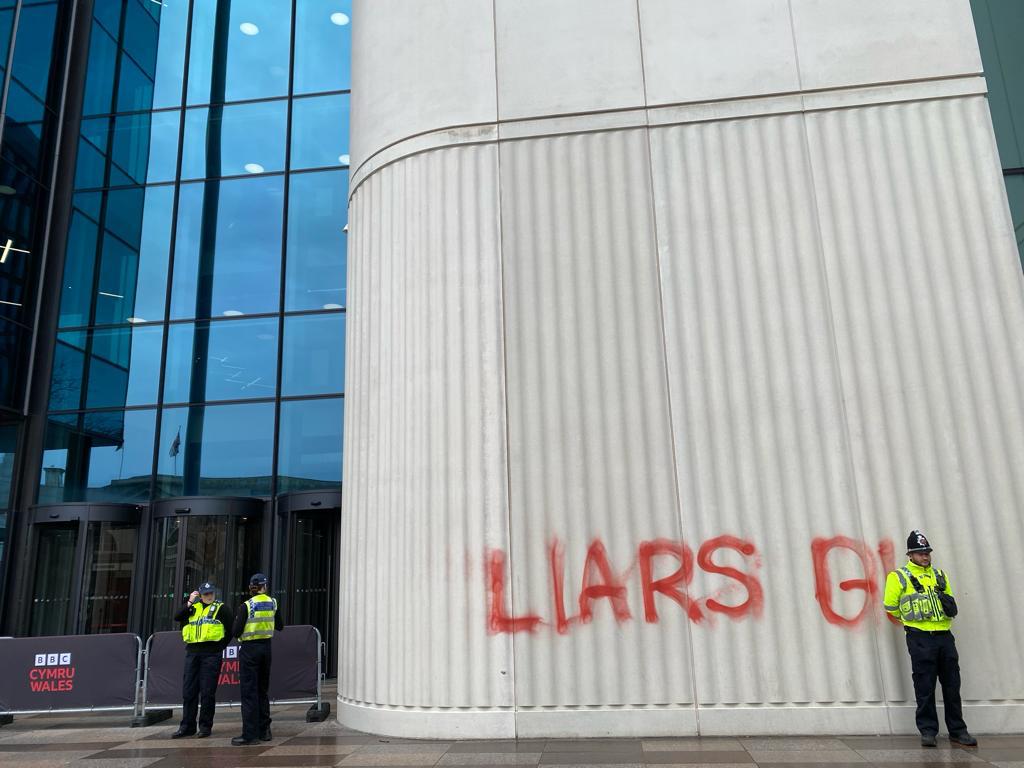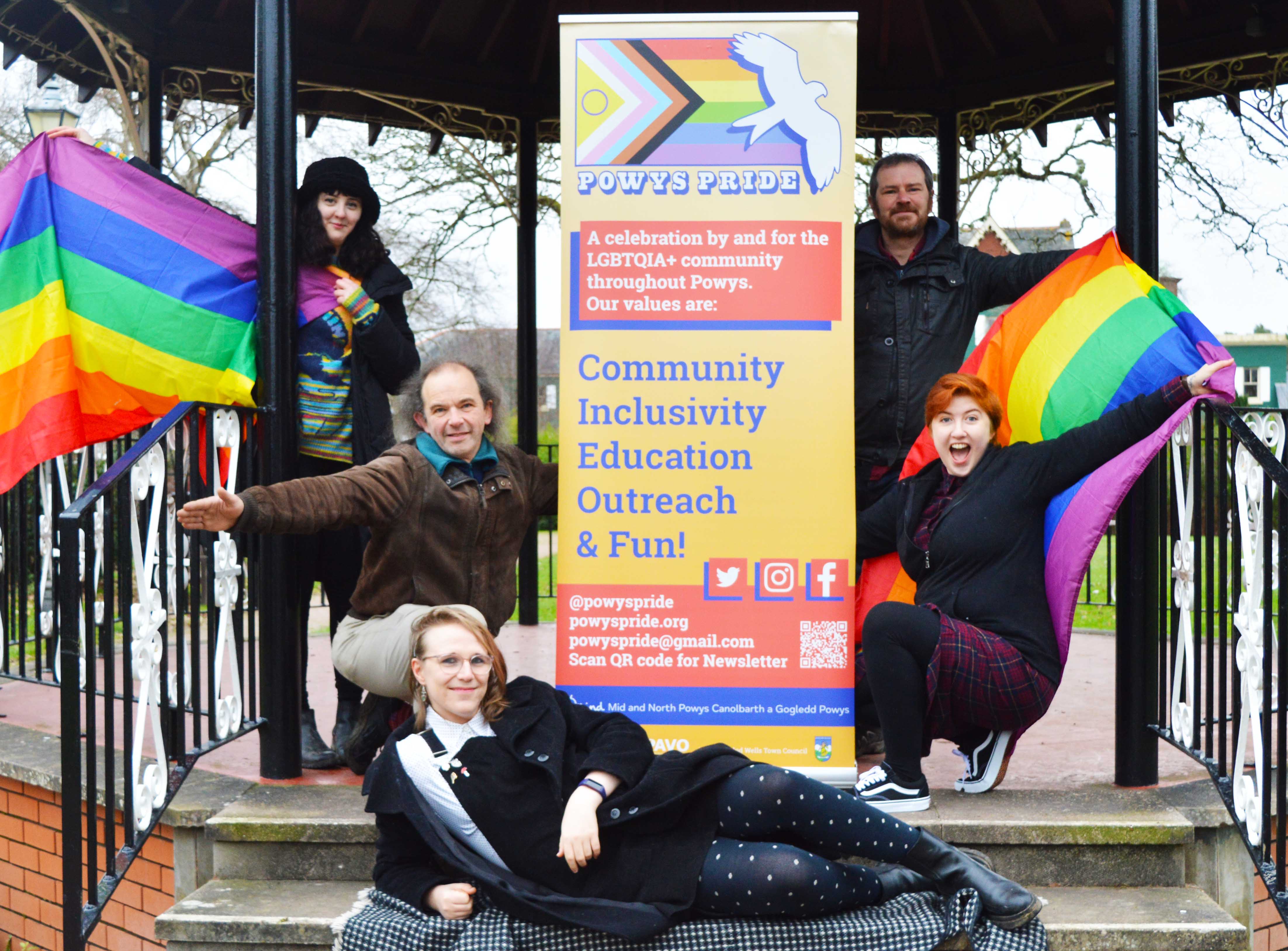
Through Bias Reporting, Our Media Has Helped Prevent A Ceasefire In Gaza
By Lujane Hamzeh. Cover image: BBC Wales is daubed with graffiti following a Palestine Solidarity march last month.
Lujane Hamzeh, a Palestinian activist, unveils the layers of media framing that help shape opinion about the Palestinian occupation and Israel’s ongoing genocide in Gaza.
In the ever-evolving landscape of global affairs, the Palestinian Occupation remains a poignant and complex issue in the eyes of many.
This demands a thorough examination of media framing, emotional responses, and the imperative of human rights-centric reporting.
Headlines, being the first point of contact between news outlets and their audience, play a pivotal role in shaping public perception. This is especially the case when it comes to Palestine.
Statistics reveal a stark reality: a significant portion of readers only engage with the headline of an article. According to a 2021 study by the Pew Research Center, 65% of the British Public reported that they occasionally or rarely read beyond the headlines.
Can you imagine how different the situation would be had the media covered the situation in Gaza with better framing from the very beginning?
This emphasises the pivotal role headlines play in shaping public opinion. Misleading or sensationalist headlines can perpetuate bias and contribute to a distorted understanding of the on-going aggression in Palestine. Editors and senior journalists bear the responsibility of crafting headlines that accurately represent the content while avoiding sensationalism.
A well-crafted headline can encapsulate the essence of a story, but it also has the power to shape perception. Ethical headline construction becomes a tool for dismantling misconceptions and fostering a more informed readership.
Let’s investigate this further. When Hamas released the two hostages, Yocheved Lifshitz, 85, and Nurit Cooper, 79, news channels were broadcasting live when Yocheved turned around and shook the hand of a Hamas member and greeted him before leaving; this left the world in shock. During her live interview on BBC, Yocheved relived the events on October 7th until the day of her release. The live translation, as well as her daughter, reiterated that she was treated well, she was fed and taken care of. However, the headline wrote “‘We went through hell”, followed by “‘We were beaten up with sticks.'” Framing in this manner causes an emotional, raging anger from an audience that had simply read the headlines.
It is with such impact that the media created hatred towards any affiliation with Hamas whatsoever, and even, the pro-palestinian rallies.
Covering the events that unfold in Gaza demands an acknowledgment of its intricate and enduring history of occupation. Unlike a one-day event, this situation spans 75 years, characterised by an interplay of geopolitical, cultural, and historical factors.
The media consistently use the term ‘conflict’ and ‘war’, with breaking news headlines that state: ‘Israel-Hamas War’ or ‘Israeli-Palestinian’ conflict.
This framing paints a picture of proportionality, assuming that both parties are on equal footing. When the reality is that Israel is an occupation force that has the fourth strongest military in the world. For example, BBC Wales released an article about ‘UK Doctor Ahmad Sabra’ returning from Gaza after being stuck in “war-torn Gaza.”
The article continues about the dire situation on the ground but fails to attribute it to anyone, misleading an uninformed audience in perceiving that a ‘war’ is being carried out on equal footing between two equal military forces.
The piece talks about buildings being ‘bombed’ and ‘destroyed,’ and water, food and shelter being ‘scarce,’ but it’s only at the very end that the reader would get any inclination that this might be because of Israel. Even then it qualifies it as a “major military campaign in the Gaza, with the aim of eliminating Hamas.”
The consistent use of phrases in the media such as ‘right to defend’ further distort the reality and shed light on Israel as the victim. Whereas media outlets fail to highlight that Gaza is worlds largest open-air ‘prison’, where civilians are monitored and their activities are under the scrutiny of the Israeli Defense Forces. Contexualising the situation would allow for the wider audience to critically assess the feasibility of the ‘right to resist.’
American news sources have continually fueled hate and anger in communities with their headlines. Fox News, known for their biased approach, assumed an ‘anti-Palestinian’ approach and condemned the support of American individuals. Headlines such as: “Marxist Connection: A tech mogul and his wife have been identified as primary funders of several pro-Palestinian protests.” The tone reads in an aggressive manner and the audience immediately assumes a negative correlation, emphasising the relation to Marxism. However, the funding of the Israeli Army is framed as a statement: “The US agrees to continued military support of Israel.”
Such organisations are responsible for providing correct information as well, as they are a catalyst for the spread of information. An unverified news source claimed that “40 beheaded babies” were found in a Kibbutz. Although no evidence was found, legitimate news organisations like Sky News, BBC and CNN took to their headlines the same story, without confirming the accuracy of the source. As legitimate organisations, the news reached the White House, leading to President Joe Biden’s claim that he had seen the pictures of the babies; this claim was later retracted by the White House and all news sources.
The wider audience will believe these organisations as they are seen as legitimate organisations that are deemed trustworthy. The emotional responses and impact on the society was evident when a 6 year-old boy was killed in an anti-muslim attack in Illinois. The boy and his family were long-term friends with the killer, who was also their landlord.
However, the hate that was fueled by the media resulted in the murder of a child.
Recent investigations carried out by the BBC have brought forward evidence that the Al-Shifa Hospital was not a Hamas base. However, the BBC were biased towards Israel and designed their articles to fit the narrative of a justified attack on the hospital.
Had they used their platform to question the moral and ethical responsibilities of an army in attacking a hospital, the outrage of the public would have seen a stronger impact on the leaders in power.
A less biased approach would have assisted in more accurate framing for the wider audience, those who have little knowledge on the historical occupation and the current aggressions. Their pro-Israeli approach has allowed for a greater focus on justifying a genocide carried out by Israel, rather than questioning the infringement of basic human rights and upholding the leaders in power to their moral and ethical responsibilities in protecting innocent civilians.
In the reporting of the situation in Ukraine, the media held a pro-Ukrainian bias. The collective support resulted in immediate action, with the ICC warranting the arrest of Vladimir Putin.
A human rights-centric narrative has the potential to spur global solidarity in addressing the immediate crises, as well as contribute to laying the groundwork for lasting peace. Framing the situation within the context of basic human rights, journalism has the power to unite diverse communities in a shared commitment to justice.
This collective support becomes a formidable force against oppressive regimes and occupation, which could have resulted in a call for an immediate ceasefire in the UK.
Lujane Hamzeh is an activist with the Palestine Solidarity Campaign and will address the National March for Palestine this Saturday, 1pm, Central Square, Cardiff
@lujanehamzeh


‘Kill the Bill’ Protesters Are Fighting for Our Democratic Rights, I Applaud Them | Beth Winter MP